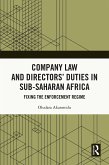The corporation's ability to avoid the costs of risks that materialize as a result of its pursuit of profits is a departure from the market model. It can easily be seen as an evasion of the obligations that go with being the un-coercing, freely-acting and choosing 'invisible hand.' Dramatic corporate collapses and major human and economic disasters due to bad corporate conduct have strengthened the common sense view that, if the corporate directors and officers have made the deliberate act their own in some way, they may be held responsible on the same basis that liberal law holds all individuals responsible for their intended actions in the non-corporate settings. Accordingly, recent decades have seen an increasing number of statutory interventions worldwide that impose direct responsibilities on directors and other corporate officers in respect of a wide range of regulatory regimes: environmental regulation, occupational health and safety and other employment standards, human rights statutes, transportation regimes, consumer and competition laws, protections for creditors and workers against insolvent trading, and the like. Legitimacy crises have pushed legislators to enlarge the number of responsibilities, to increase the amounts of the fines that may be levied and to make it clear that, in some cases, prison sentences will be imposed. This collection of essays describes and analyzes the legal regimes governing directors' liability for corporate fault and default across eleven important trading jurisdictions. It asks: Are the reform provisions, especially director duties of 'due diligence,' sharply enough aimed to attain the goal of corporate accountability? Will it be easy or difficult for defendants to establish that due diligence was exercised? Is it possible that more reliance on self-policing may lead to less documenting and reporting of wrongs and dangers? What impact may schemes of greater self-monitoring have on State regulation? In what ways might corporations react to these demands that they become guardians of the public weal? The authors - each an authority in his or her respective jurisdiction - recognize that the reforms are a reaction to the political problems created by the ill fit of the corporation with the economic and political value systems that we purport to hold dear. As they survey the ways that vibrant economies can frame laws to influence the conduct of directors and companies, they invite further exploration into the political, economic, practical, and evolutionary factors that may explain the convergence and divergence of both statute law and judicial doctrines and the desirability or inevitability of this deeply significant trend.
Dieser Download kann aus rechtlichen Gründen nur mit Rechnungsadresse in A, B, BG, CY, CZ, D, DK, EW, E, FIN, F, GR, HR, H, IRL, I, LT, L, LR, M, NL, PL, P, R, S, SLO, SK ausgeliefert werden.









